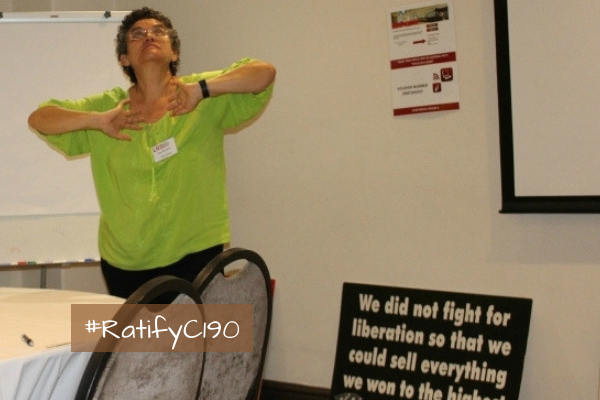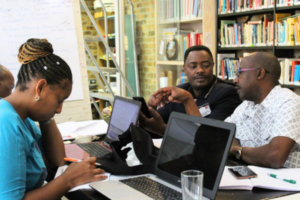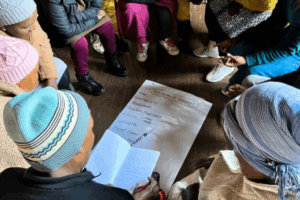LRS Executive Director, Trenton Elsely, spoke with Nina Benjamin (pictured at an LRS collective bargaining workshop) about what it means to celebrate Women’s Month amid a pandemic. Nina heads the Gender Equality Programme of the Labour Research Service.
Is Women’s Month relevant during a global pandemic?
Women’s month is extremely important now. From our findings to the media coverage, all indications are that the covid-19 pandemic has a woman’s face. One common thread that emerged in our many conversations with women worker leaders in different sectors is that the pandemic is particularly harsh on women. The huge number of women in precarious work will bear the worst brunt because of the kinds of jobs they do. Precarious jobs are the most likely to be cut or have reduced wages in a crisis. We know that domestic workers have been hard hit. Also, there’s an incredible increase in reproductive work for women.
What has covid-19 showed us about gender relations in South Africa?
The pandemic put care work on top of the agenda and showed that it’s essential especially during a crisis. Women have taken a myriad of roles in the home environment, from homeschooling to caring for the sick. The pandemic put a spotlight on both paid and unpaid care work and confirmed that globally, women disproportionately carry the burden of all forms of care work.
Did the pandemic bring the men home and pulled them to share the burden of care work?
Some men are now taking on more care work. But the pandemic hasn’t changed gender relations in South Africa. Men being at home hasn’t lessened the burden of care work on women. The rise in domestic violence was a predictable side effect of the covid-19 lockdown. Women and children who live with domestic violence are more at risk; men feel trapped at home and usually take out their frustration on the family. Men often see themselves as belonging in the public space only popping into the private space of the home when they need some kind of care.
What measures do we have of the changes in the level of domestic violence currently?
President Cyril Ramaphosa said gender-based violence is another pandemic raging in the country. The reported cases and calls to hotlines are increasing, women shelters are overwhelmed and there have been some horrific killings. The question is, is this part of normality that the lockdown emphasised? Still, the anecdotal evidence can inform work on the issue of gender inequality and gender-based violence.
What has the prohibition on the sale of alcohol meant for women and domestic violence?
Hospitals reported reduced trauma cases due to the ban on alcohol. But the news from the women we talked with wasn’t positive: the ban increased violence in homes. I wouldn’t like us to treat August month as this.
How should we view August month?
August month is about women’s agency, victories and the current struggles. Our focus should be on the value of care work and not just the problems that women face. We must change the conversation and begin to champion the economy of care.
If care work is systematically undervalued, how do we start to value it in our society and economy?
We must continue to profile the stories on the kind of paid and unpaid work that women do. We should then start looking at the contribution of women’s work to the economy. What is the role of care work in society? What is the economic value of care work? And we can draw from the Nordic countries that have quantified and determined the contribution of care work to their GDPs. If this will get people to value the contribution of care work then we need to do it now. The conversation about what the economy should look like is patriarchal and skewed. We are having the same conversations to solve the same problems this idea of the economy has caused. The crisis has exposed our failure to recognise that an economy is about creating the means to ensure that everyone is cared for. August month is the time to put that on the agenda.







